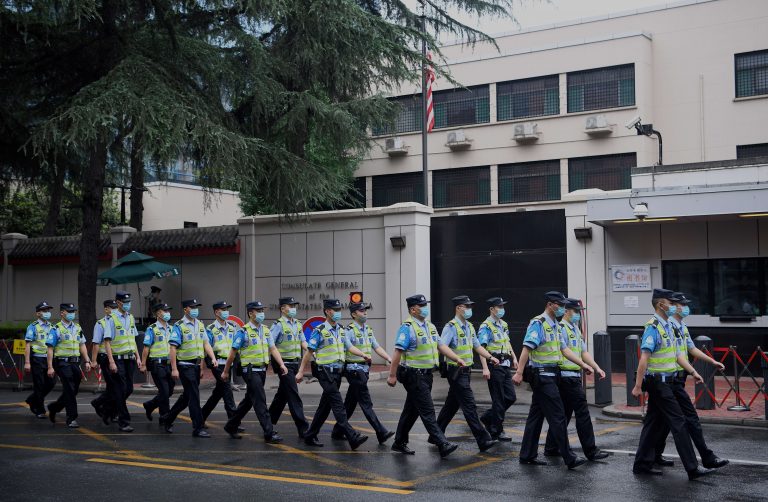A March 4 report by the Pew Research Center detailed the results of a survey on the American public’s feelings towards China. Attitudes on the country and its communist government have continued to worsen, particularly in areas such as cybersecurity, military aggression, and human rights.
The survey questioned Americans on their attitude towards China in several different categories, including economics, human rights, technology, military power, coronavirus handling, the environment, and international students.
Four of the survey areas stood out as topics of serious concern among the American public regarding China’s role in cyberattacks, job loss, the growing military power of the Chinese People’s Liberation Army (PLA), and human rights violations by the Chinese Communist Party (CCP).
The increasing negative sentiments in the American public towards the Chinese government is also reflective in other countries, as found in an earlier Pew survey released in October 2020. Respondents in countries such as Belgium, Denmark, the UK, Sweden, Canada, Australia, and Japan reported overall unfavorable views on China, with such sentiments having deepened over the last year.
Communist threat
The threat of cyberwarfare by the PLA ranked high on the list of issues Americans felt to be of significant concern, with two-thirds of respondents believing it a serious problem — seven percentage points higher than last year’s survey. Last summer, FBI Director Christopher Wray made statements condemning Chinese cyberattacks.
Success
You are now signed up for our newsletter
Success
Check your email to complete sign up
Speaking at the Hudson Institute in June 2020, Wray said, “To achieve its goals and surpass America, China recognizes it needs to make leaps in cutting edge technology, but the sad fact is that instead of engaging in the hard slog of innovation, China often steals American intellectual property and then uses it to compete against the very American companies it victimizes, in effect, cheating twice.”

He also warned that the Chinese government targets “research on everything from military equipment to wind turbines.” In recent months, the Center for Strategic & International Studies (CSIS) has reported that Chinese hackers targeted Japanese organizations, Southeast Asian governments, and the National Data Center of Mongolia. Hackers connected to the Chinese government targeted gaming and gambling countries, demanding a ransom of $100 million.
The loss of U.S. jobs to China saw a six-point increase from 2020, with 53 percent of those surveyed this year seeing the issue as significant. One 82-year-old male respondent said that “They are actively working to take over the U.S. economically rather than militarily. They are pulling our manufacturing abilities, copying advanced technologies, buying up large-scale U.S. corporations and they own much of our debt. They are methodically taking over control of our economy.”
The novel coronavirus pandemic has highlighted the seriousness of relying on China as the sole manufacturer in a supply chain far from domestic consumers. When the scarcity of medical equipment and PPE arose during the height of the pandemic in 2020, the bottleneck in supplies pointed towards Beijing, as equipment manufacturing has been moving offshore from the U.S. to China over the past few decades.

Forty-nine percent of respondents expressed concern at the growing strength of the PLA. During the National People’s Congress meeting in Beijing that began March 5, it was announced that Chinese defense spending would increase 6.8 percent this year to $208 billion.
This comes after deadly skirmishes with India over border disputes, and flaring tensions with Taiwan. As recently as February, hackers connected to the Chinese military targeted Tibetans within China and outside the country. As recently as January, the PLA sent combat aircraft over the Taiwan Strait in a show of force concurrent with Joe Biden’s assumption of the U.S. presidency.
To counter U.S. assistance in China’s military growth, American investments in entities related to the Chinese military have been restricted. In November 2020, the Trump administration barred U.S. investments into private Chinese companies with military ties, warning that the PLA uses these entities as a means of modernizing and developing their technology.
Chinese human rights
About 50 percent of respondents see China’s human rights violations as a very serious issue, up by seven points from last year’s. Also, another 31 percent of Americans feel human rights in China to be a somewhat serious issue for a total of 84 percent of all Americans surveyed.
Ninety percent of respondents believe China does not respect the personal freedoms of its citizens. The past year has seen the Chinese crackdown on democracy in Hong Kong through arrests under the new National Security Law, which undermines the former British colony’s Basic Law.

Recent years have seen China’s further clampdown against Christians and continued persecution of the Falun Gong spiritual practice. The use of concentration camps and forced labor on the Uyghur Muslim minority group of China’s Xinjiang region has been highlighted through numerous news reports and calls to end the use of goods and labor in international supply chains.
Seventy percent of surveyed American individuals believe the U.S. and other countries should prioritize promoting human rights in China even at the risk of harming economic relations. This sentiment crosses political affiliations, education level, and age groups of those surveyed.
As one surveyed respondent put it, “When I think of China, the first thing that comes to mind is the oppressive measures it takes on those within its borders, especially the plight of Uyghur Muslims, but also the restrictions placed by the Communist government on free speech and dissent by its citizens.”
Follow us on Twitter or subscribe to our email list

















